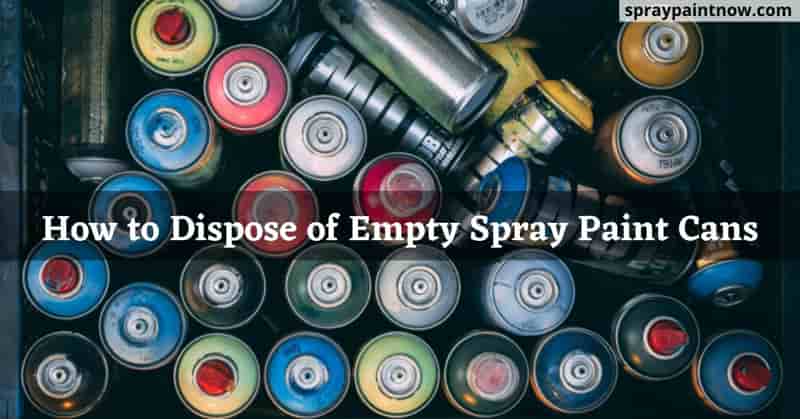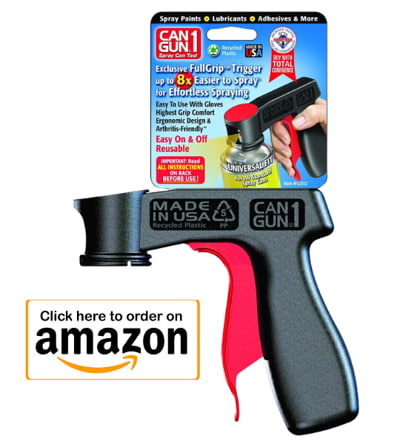Empty spray paint cans are not harmless pieces of metal. If disposed of improperly, they can be dangerous and pollute the environment. In this blog post, we will show you how to dispose of empty spray paint cans safely and responsibly and discuss the dangers of improperly disposing of them. Keep reading to learn more!
How do you identify an empty spray paint can?
It’s important to identify one before we discuss how to dispose of empty spray paint cans. An empty spray paint can is typically lightweight and has a concave bottom. It will also usually have a label that says “empty” or “contains no material.” If you’re unsure whether a can is truly empty, it’s always better to err on the side of caution and assume it still contains some product.
How to dispose of empty spray paint cans
There are several different ways to dispose of an empty spray paint can, and the best method will vary depending on your location and resources. The most important thing is to ensure the can is truly empty before you attempt to dispose of it.
One way to dispose of empty spray paint cans is to take them to a local hazardous waste facility. This is the best option if you want to ensure the can will be disposed of properly. To find a hazardous waste facility near you, check out this website: earth911.com
Another way to dispose of empty spray paint can is to recycle it. Many communities have programs in place to recycle empty cans. To find out if your community has such a program, contact your local recycling center or visit this website: recycling-revolution.com
A final option for disposing of empty spray paint can is to dispose of it by yourself. If you choose to do this, you must take the proper precautions. First, make sure that the can is truly empty. Then, puncture the can several times with a sharp object (such as a screwdriver) to release any remaining pressure. Once the can is punctured, place it in a trash bag and seal it shut. Finally, put the trash bag in a larger garbage can or dumpster to prevent anyone from coming into contact with the can.
How to Empty Spray Paint Cans
It’s important to ensure that spray paint cans are truly empty before attempting to dispose of them. If even a small amount of product is left in the can, it could be released into the environment and cause pollution.
The best way to empty a spray paint can is to use it until it’s truly empty. You can try a few other methods if you can’t do this. One is to turn the can upside down and spray until nothing comes out. Another is to puncture the can and let the product drain out.
Once you’ve verified that the can is truly empty, you can dispose of it in one of the ways described above.
How to remove the lid and nozzle from an empty spray paint can
If you’re recycling an empty spray paint can, you’ll need to remove the lid and nozzle before doing so. This can be done easily with a pair of pliers. Simply grip the edge of the lid with the pliers and twist it until it comes loose. Then, do the same with the nozzle. Once the lid and nozzle are removed, they can be recycled like any other type of metal.
How to dispose of unused spray paint can
If you have a spray paint can that you haven’t used, the best thing to do is to return it to the store where you bought it. Most stores have programs in place to recycle unused cans. If you can’t return the can to the store, you can dispose of it in one of the ways described above.
When disposing of unused spray paint can, it’s important to ensure the can is truly empty. The best way to do this is to puncture the can and let the product drain out. Once the can is punctured, place it in a trash bag and seal it shut. Finally, put the trash bag in a larger garbage can or dumpster to prevent anyone from coming into contact with the can.
Dangers of improperly disposing of empty spray paint cans
As mentioned above, empty spray paint cans can be dangerous if not disposed of properly. This is because they often still contain small amounts of product that can be released into the environment and cause pollution. In addition, the cans themselves can be sharp and cause injuries if someone comes into contact with them.
Also, if the cans are not punctured or properly disposed of, they can build up pressure and explode. This is a serious safety hazard that should be avoided at all costs.
To sum up, it is important to take the proper precautions when disposing of empty spray paint cans. Make sure the cans are truly empty before disposing of them, and be sure to recycle or dispose of them properly to avoid any environmental or safety hazards.
FAQ
Q: Where can I recycle an empty spray paint can?
A: Many recycling centers accept empty metal cans, including spray paint cans. You can also check with your local waste management department to see if there are any special instructions for recycling these cans.
Q: How do I know if a spray paint can is truly empty?
A: The best way to know for sure is to use the can until it’s truly empty. If you can’t do this, you can turn the can upside down and spray until nothing comes out. Another option is to puncture the can and let the product drain out.
Q: What happens if I don’t recycle an empty spray paint can?
A: If you don’t recycle an empty spray paint can, it will likely end up in a landfill. This is not ideal because the can will take up space and could potentially cause environmental problems if it leaks.
Q: What are the dangers of improperly disposing of an empty spray paint can?
A: If improperly disposed of, empty spray paint cans can be dangerous. This is because they often still contain small amounts of product that can be released into the environment and cause pollution. In addition, if someone accidentally hits an open-mouth can, they might cut themselves on the sharp edges of the container.
Q: How do you dispose of a Rustoleum spray paint can?
A: The best way to dispose of Rustoleum spray paint is to take it to a local recycling center. Rustoleum spray paint cans are made of metal and can be recycled like any other metal can.
Conclusion
I believe you know how to dispose of empty spray paint cans responsibly. Be sure to recycle or dispose of them properly to avoid any environmental or safety hazards. If you have any questions, feel free to ask in the comments section below. And as always, thanks for reading!

